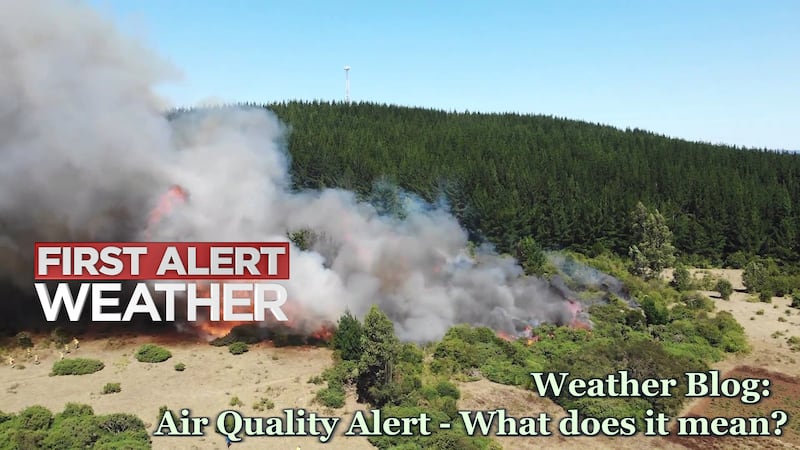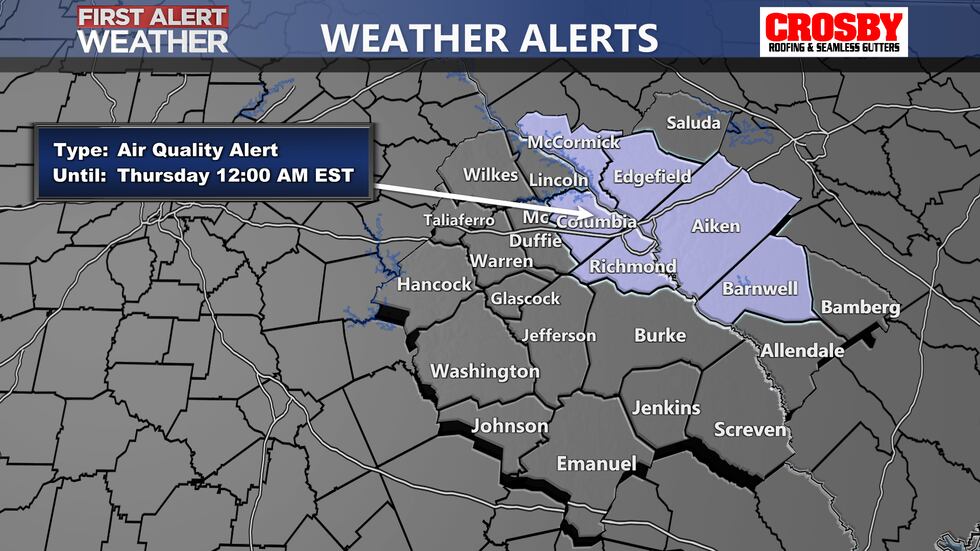Weather Blog: Air Quality Alert - What does it mean?
Controlled burns across the CSRA could lead to air quality concerns Wednesday as high pressure keeps smoke and haze near the surface.

AUGUSTA, Ga. (WRDW/WAGT) - Air Quality Alerts have been issued for select locations in the CSRA. Air Quality Alerts are issued based on different levels that measure the amount of particles in the air.
High pressure over the region will lead to stagnant conditions and poor air quality Wednesday. High pressure in our atmosphere leads to sinking air - keeping pollutants near the surface. Surface winds also look to stay calm, which will prevent mixing. This combination will help keep pollutants from controlled burns near the surface Wednesday during the day and lead to poor air quality.
| Air Quality Level | Impacts |
|---|---|
| Good | No Health Risks |
| Moderate | Very sensitive people may wish to limit outdoor exertion |
| Unhealthy (for Sensitive Groups) | Sensitive people should limit outdoor exertion |
| Unhealthy | Everyone should limit exertion outdoors |
| Very Unhealthy | Sensitive people should avoid all outdoor activity |
| Hazardous | Everyone should avoid outdoor activity |

The National Weather Service issued an Air Quality Warning for Wednesday saying, “A code orange Air Quality Alert means that the fine particulate concentrations within the specified areas may approach or exceed unhealthy standards for individuals sensitive to particle pollution. High pressure over the southeast U.S. will continue to dominate the region and minimize smoke dispersion from numerous controlled burns in South Carolina and Georgia. Stable conditions and very little wind will enhance the noticeability of smoke, especially in the overnight and morning hours. The Department of Environmental Services recommends that individuals with respiratory health issues limit time spent outdoors and/or move all activities indoors to avoid the smoke or fine particulates. Keep windows and doors closed. Run an air conditioner if you have one but keep the fresh-air intake closed and the filter clean to prevent outdoor smoke and fine particulates from getting inside.”
The National Weather Service offers a few safety tips when it comes to dealing with smoky/hazy conditions:
- Stay inside if possible, particularly if you have respiratory concerns or other health problems, are a senior or child
- If you must go out, try to limit the amount of time you are out to strictly essential activities
- Minimize your use of items that increase pollution, such as cars, gas-powered lawnmowers, and other vehicles
- Do not burn debris or other items during an air quality alert
The top five air-polluting particles according to AirNow are:
- ground-level ozone
- particle pollution (also known as particulate matter, including PM2.5 and PM10)
- sulfur dioxide
- nitrogen dioxide
- carbon monoxide
There also some tips to help you protect air quality indoors. Even though controlled burns can create smoke and haze, they are necessary to thin out excess underbrush in our wooded areas and prevent future wildfires from occurring.
The top cause of pollution in Georgia behind farming and power plants is traffic. Researchers at Environment Georgia estimates poor air quality kills 9,000 Georgians each year. Environmental Georgia found at least 10 places in Georgia with elevated pollution and ozone levels. The worst city in our state is Augusta, suffering more than 101 days of unsafe air quality, followed by Albany, northwest Georgia, Middle Georgia, and Atlanta.
In the short term, conditions are expected to improve over the next few days. Rainfall is expected to move in Thursday afternoon/evening.
Copyright 2023 WRDW/WAGT. All rights reserved.















